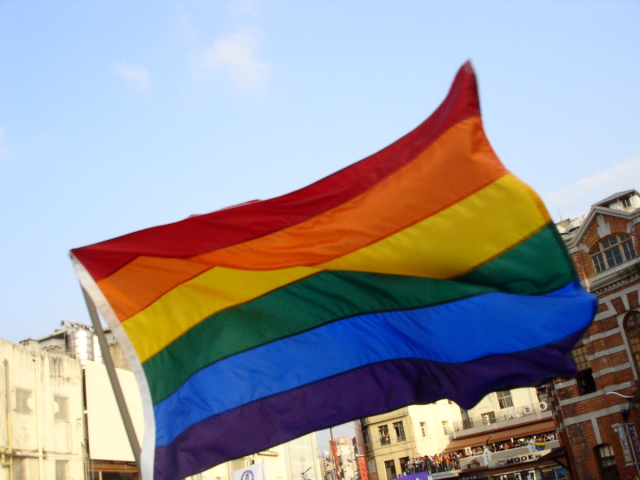
Voices concern that disruptive gatherings will hurt public perception of LGBT community.
25-year-old Kanon Aoki was born with male genitalia, but from around the age of five began to identify more as a woman. Still, the Tokyo native, born to a Filipino mother and Japanese father, continued to live outwardly as a boy, even playing on baseball teams throughout elementary, middle, and high schools, out of fear of how her father would react if she began living as a woman.
Finally, in the last year of high school, Aoki revealed her gender identity to her parents, and her fears turned out to be very justifiable, as her father responded by jumping on her back and striking her multiple times. After high school, Aoki would undergo voice training to raise her speaking octave, and, with the encouragement of a friend, began wearing women’s clothing when going out in public.
▼ Kanon Aoki
今まで本当にありがとうございました。 https://t.co/0clJPWI2FB pic.twitter.com/CCZ7hW5nwr
— 🍓青木歌音🍓 (@memory_kanon) July 31, 2018
Now moved out of her parents’ home, Aoki has a YouTube channel with 130,000 subscribers, over 16,000 followers on Twitter, and has made a handful of television appearances.
▼ Aoki’s most recent full-length video, documenting the birthday presents she bought for herself.
Last Sunday, Aoki was walking by Shibuya Station, one of downtown Tokyo’s major rail hubs, where a group of people had gathered for an LGBT demonstration. Given her background, some might have expected her to join the crowd, and perhaps even say a few words. Instead, she sent out a message saying:
“I passed by Shibuya Station, and there was a huge LGBT demonstration going on.
If people hold demonstrations and gatherings that cause that much commotion, the rest of society will see LGBT people as people to be fearful or wary of.
Society at large views people like me who changed their sex as part of the LGBT community, but I changed my sex without thinking about it so deeply, so I’m not really concerned at all with LGBT issues.”
It’s unclear whether Aoki’s claim that she “changed her sex” is predicated on any sort of gender reassignment surgery/treatment, or purely on her way of thinking and presenting herself. She also didn’t expand on her reasoning as to how changing her sex doesn’t necessarily make her part of the LGBT demographic.
Aoki’s tweet produced numerous online comments from others saying that they have no problems with people being lesbian, gay, bisexual, or transgender, but that they too wish the community wouldn’t stage loud, large-scale demonstrations in such already heavily trafficked areas as Shibuya. There were, however, a few dissenters in the mix too, who left comments such as:
“Well, honestly the majority LGBT people wish they could just be left alone too.”
“You might not be concerned at all with LGBT issues, but other people are.”
“[Aoki’s] kind of thinking is a problem among Japanese people. This time the topic is LGBT issues, but [her kind of] attitude is just the sort of thing that plays into the designs of powerful politicians and wealthy people.”
Aoki’s tweet has since been deleted, though she herself has offered no explanation as to the exact reason why.
Source: Twitter/@ memory_kanon via Hachima Kiko, Wikipedia, Share News Japan
Top image: Wikipedi/Theodoranian

 Commercial reveals what some LGBT individuals go through in Japan
Commercial reveals what some LGBT individuals go through in Japan Kirin beer company toasts same-sex marriages for its employees
Kirin beer company toasts same-sex marriages for its employees Anger sparks as Tokyo politician claims “legally protecting lesbians and gays will ruin district”
Anger sparks as Tokyo politician claims “legally protecting lesbians and gays will ruin district” Japan’s largest housing website to offer LGBT support in finding tolerant landlords
Japan’s largest housing website to offer LGBT support in finding tolerant landlords Same-sex prostitution business technically legal in Japan, goes untouched by police
Same-sex prostitution business technically legal in Japan, goes untouched by police Foreigner’s request for help in Tokyo makes us sad for the state of society
Foreigner’s request for help in Tokyo makes us sad for the state of society Japanese-style accommodation at the new Premium Dormy Inn hotel in Asakusa will blow your mind
Japanese-style accommodation at the new Premium Dormy Inn hotel in Asakusa will blow your mind Mikado Coffee is a 76-year-old coffee chain with a major celebrity connection
Mikado Coffee is a 76-year-old coffee chain with a major celebrity connection W.T.F. Japan: Top 5 most offensive Japanese swear words 【Weird Top Five】
W.T.F. Japan: Top 5 most offensive Japanese swear words 【Weird Top Five】 The oldest tunnel in Japan is believed to be haunted, and strange things happen when we go there
The oldest tunnel in Japan is believed to be haunted, and strange things happen when we go there Same character, different animator – Fans compile comparison charts for anime’s biggest stars
Same character, different animator – Fans compile comparison charts for anime’s biggest stars Fried sandwiches arrive in Tokyo, become hot topic on social media
Fried sandwiches arrive in Tokyo, become hot topic on social media We tried Korea’s way-too-big King Tonkatsu Burger at Lotteria 【Taste Test】
We tried Korea’s way-too-big King Tonkatsu Burger at Lotteria 【Taste Test】 5 cultural tips for taking photos in Japan
5 cultural tips for taking photos in Japan Now you can be one step closer to the very best with your very own life-size, realistic Poké Ball
Now you can be one step closer to the very best with your very own life-size, realistic Poké Ball McDonald’s new Happy Meals offer up cute and practical Sanrio lifestyle goods
McDonald’s new Happy Meals offer up cute and practical Sanrio lifestyle goods Japanese ramen restaurants under pressure from new yen banknotes
Japanese ramen restaurants under pressure from new yen banknotes French Fries Bread in Tokyo’s Shibuya becomes a hit on social media
French Fries Bread in Tokyo’s Shibuya becomes a hit on social media Red light district sushi restaurant in Tokyo shows us just how wrong we were about it
Red light district sushi restaurant in Tokyo shows us just how wrong we were about it New private rooms on Tokaido Shinkansen change the way we travel from Tokyo to Kyoto
New private rooms on Tokaido Shinkansen change the way we travel from Tokyo to Kyoto Tokyo Tsukiji fish market site to be redeveloped with 50,000-seat stadium, hotel, shopping center
Tokyo Tsukiji fish market site to be redeveloped with 50,000-seat stadium, hotel, shopping center Japanese city loses residents’ personal data, which was on paper being transported on a windy day
Japanese city loses residents’ personal data, which was on paper being transported on a windy day Beautiful Ghibli sealing wax kits let you create accessories and elegant letter decorations【Pics】
Beautiful Ghibli sealing wax kits let you create accessories and elegant letter decorations【Pics】 Secret Kitchen bento serves Japanese flowers, birds, wind and moon in a box, but is it worth it?
Secret Kitchen bento serves Japanese flowers, birds, wind and moon in a box, but is it worth it? New definition of “Japanese whiskey” goes into effect to prevent fakes from fooling overseas buyers
New definition of “Japanese whiskey” goes into effect to prevent fakes from fooling overseas buyers Our Japanese reporter visits Costco in the U.S., finds super American and very Japanese things
Our Japanese reporter visits Costco in the U.S., finds super American and very Japanese things Studio Ghibli releases Kiki’s Delivery Service chocolate cake pouches in Japan
Studio Ghibli releases Kiki’s Delivery Service chocolate cake pouches in Japan All-you-can-drink Starbucks and amazing views part of Tokyo’s new 170 meter-high sky lounge
All-you-can-drink Starbucks and amazing views part of Tokyo’s new 170 meter-high sky lounge More foreign tourists than ever before in history visited Japan last month
More foreign tourists than ever before in history visited Japan last month New Pokémon cakes let you eat your way through Pikachu and all the Eevee evolutions
New Pokémon cakes let you eat your way through Pikachu and all the Eevee evolutions Disney princesses get official manga makeovers for Manga Princess Cafe opening in Tokyo
Disney princesses get official manga makeovers for Manga Princess Cafe opening in Tokyo Sales of Japan’s most convenient train ticket/shopping payment cards suspended indefinitely
Sales of Japan’s most convenient train ticket/shopping payment cards suspended indefinitely Sold-out Studio Ghibli desktop humidifiers are back so Totoro can help you through the dry season
Sold-out Studio Ghibli desktop humidifiers are back so Totoro can help you through the dry season Japanese government to make first change to romanization spelling rules since the 1950s
Japanese government to make first change to romanization spelling rules since the 1950s Ghibli founders Toshio Suzuki and Hayao Miyazaki contribute to Japanese whisky Totoro label design
Ghibli founders Toshio Suzuki and Hayao Miyazaki contribute to Japanese whisky Totoro label design Doraemon found buried at sea as scene from 1993 anime becomes real life【Photos】
Doraemon found buried at sea as scene from 1993 anime becomes real life【Photos】 Tokyo’s most famous Starbucks is closed
Tokyo’s most famous Starbucks is closed One Piece characters’ nationalities revealed, but fans have mixed opinions
One Piece characters’ nationalities revealed, but fans have mixed opinions We asked a Uniqlo employee what four things we should buy and their suggestions didn’t disappoint
We asked a Uniqlo employee what four things we should buy and their suggestions didn’t disappoint Same-sex couples to be recognized in Sapporo, Japanese city with population of around two million
Same-sex couples to be recognized in Sapporo, Japanese city with population of around two million Evangelion anime voice actress says gay man grabbed her chest in Tokyo bar district
Evangelion anime voice actress says gay man grabbed her chest in Tokyo bar district Tokyo’s Shibuya Ward to offer marriage certificates to same-sex couples
Tokyo’s Shibuya Ward to offer marriage certificates to same-sex couples Mie Prefecture to become first in Japan to ban outing LGBT individuals
Mie Prefecture to become first in Japan to ban outing LGBT individuals Japanese public school to allow male students to wear skirts, chest ribbons as part of uniform
Japanese public school to allow male students to wear skirts, chest ribbons as part of uniform Tokyo women’s university will accept transgender students who identify as female, a Japan first
Tokyo women’s university will accept transgender students who identify as female, a Japan first Kamen Rider, one of Japan’s greatest heroes, arrested for groping woman’s breasts in Tokyo suburb
Kamen Rider, one of Japan’s greatest heroes, arrested for groping woman’s breasts in Tokyo suburb Two Tokyo wards issue Japan’s first ever same-sex partnership certificates
Two Tokyo wards issue Japan’s first ever same-sex partnership certificates Japanese high schools stop asking students to specify their gender on application forms
Japanese high schools stop asking students to specify their gender on application forms Japanese gay community at the centre of new “Tokyo Neighbors” web series 【Video】
Japanese gay community at the centre of new “Tokyo Neighbors” web series 【Video】 Sailor Uranus & Neptune make it to LogoTV’s character semi-finals
Sailor Uranus & Neptune make it to LogoTV’s character semi-finals Japanese women show overwhelming resistance to unisex bathrooms in survey
Japanese women show overwhelming resistance to unisex bathrooms in survey Company president motivates employees via vending machine with personalised messages
Company president motivates employees via vending machine with personalised messages LDP deems gay rights legislation ‘unnecessary’ according to multi-party survey
LDP deems gay rights legislation ‘unnecessary’ according to multi-party survey Tokyo’s Setagaya Ward to begin legally recognizing same-sex partnerships
Tokyo’s Setagaya Ward to begin legally recognizing same-sex partnerships Same-sex couples take Japanese government to court, request constitutional marriage rights
Same-sex couples take Japanese government to court, request constitutional marriage rights
Leave a Reply